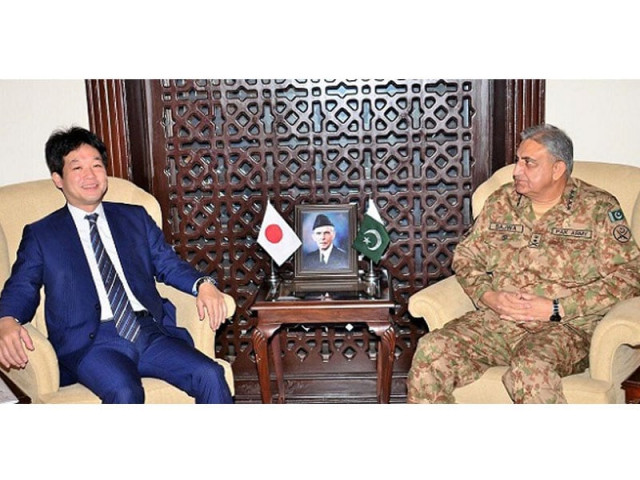Pakistan, Japan vow to enhance efforts for regional peace
Tokyo, Islamabad reiterate desire for stronger ties; sign agreement for import of Pakistani manpower

COAS General Qamar Javed Bajwa met Sonoura Kentaro, Special Adviser for Foreign Affairs to Japan's President Shinzo Abe, on Monday. PHOTO: ISPR
This resolve was expressed in a meeting between army chief General Qamar Javed Bajwa and Sonoura Kentaro, Special Adviser for Foreign Affairs to Japan's President Shinzo Abe.
"During the meeting matters of mutual interest including overall regional security situation were discussed," read a statement issued by the military's media wing.
"Visiting dignitary appreciated and acknowledged Pakistan’s positive role in the region. Both reiterated the desire to further enhance bilateral relations including efforts for peace and security in the region," read the Inter-Services Public Relations (ISPR) statement.
Japan's PM cancels India visit amid Assam unrest
Earlier on Monday, Kentaro met Foreign Secretary Sohail Mahmood in Islamabad.
The two held wide-ranging discussions on Pakistan-Japan relations and ways to further strengthen Tokyo and Islamabad's growing partnership in diverse fields.
Foreign Secretary Sohail Mahmood received Mr. Sonoura Kentaro, Special Adviser for Foreign Affairs to Prime Minister Shinzo Abe, at Foreign Office today.
Wide-ranging exchanges on Pakistan-Japan relations and ways to further strengthen growing partnership in diverse fields. pic.twitter.com/7Azgef2BY4
— Spokesperson, Ministry of Foreign Affairs Pakistan (@ForeignOfficePk) December 23, 2019
MoU for manpower import
Pakistan and Japan also formally signed a Memorandum of Cooperation (MoC) for import of skilled Pakistani manpower.
Ambassador of Japan to Pakistan Kuninori Matsuda and Aamir Hasan, the federal secretary of the Ministry of Overseas Pakistanis and Human Resource Development, signed the agreement.
As per a statement, the agreement pertains to "Specified Skilled Workers" and "aims to pave the way for skilled Pakistani workers to get employment opportunities in Japan ... after passing the required examination".
The 14 specified fields for skilled workers include nursing care, building cleaning and management, forges and foundries, machine parts and tooling industries, electric, electronics and information industries, construction industry, shipbuilding/ship machinery industry, automobile maintenance, aviation industry, accommodation industry, agriculture, fishery and aquaculture, manufacture of food and beverages, and the food service industry.
President Abe's special adviser Sonoura Kentaro and Sayed Zulfikar Abbas Bukhari, PM Imran Khan's special assistant on overseas Pakistanis and human resource development, witnessed the signing ceremony.
"This cooperation would provide job opportunities for Pakistani workers and beyond that, this framework will create new opportunities for Japan-Pakistan cooperation including education, business and tourism," Ambassador Matsuda said in his address.
"I hope many talented Pakistani workers would get an opportunity to work in Japan through this cooperation framework."
The statement added that the government of Japan has created a new "Status of Residence" for specific skilled workers that became effective on April 1, 2019.
"For this purpose, it has amended the 'Immigration Control and Refugee Recognition Act' and took comprehensive measures for the acceptance of foreign workers. This policy has been introduced to accept foreign nationals who possess certain expertise and skills in specified 14 fields as Japan is facing serious shortage of labour due to its ageing society," read the statement.
"Japan expects to hire services of 340,000 skilled workers across the world during next five years but there is no country specific quota marked for it."
"Under this policy, all foreign skilled workers entering Japan for employment would have to pass the skill’s examination and the Japanese basic language test before signing the employment contract with the accepting organisation. This MOC was signed in order to prevent the intervention by malicious intermediary business operators (agents/consultants)," the statement concluded.
Pakistan is among the top 10 countries where Japan is looking to hire skilled human resource, as Tokyo has already signed similar agreements with countries including Philippines, Thailand, Indonesia, Cambodia, Mongolia, Vietnam, Uzbekistan, Nepal, Sri Lanka and Bangladesh.



















COMMENTS
Comments are moderated and generally will be posted if they are on-topic and not abusive.
For more information, please see our Comments FAQ